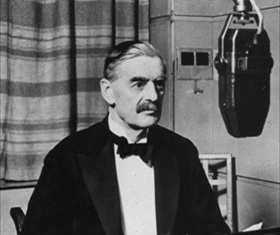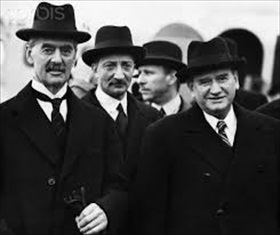BRITAIN DECLARES WAR ON GERMANY
London, England · September 3, 1939
Addressing a national audience by radio, Prime Minister Neville Chamberlain intoned the following words: “This morning the British ambassador in Berlin handed the German Government a final Note stating that, unless we heard from them by 11 o’clock that they were prepared at once to withdraw their troops from Poland, a state of war would exist between us. I have to tell you now that no such undertaking has been received, and that consequently this country is at war with Germany.” For Britons, these words are as memorable as President Franklin D. Roosevelt’s before a national radio audience on December 8, 1941, one day after the “Day of Infamy,” Japan’s surprise assault on the U.S. Pacific Fleet at Pearl Harbor, Hawaii. At midday Chamberlain spoke to Members of Parliament, saying: “This is a sad day for all of us, and to none is it sadder than for me. Everything that I have worked for, everything that I hoped for, everything I have believed in during my public life has crashed into ruins.”
As part of the preparations for the ensuing war, Chamberlain recruited new members to his cabinet, the most notable being Winston Churchill. For months many in the English press had clamored for Churchill’s return to government—the veteran politician had been “exiled” by his Conservative political party in December 1936 and later became a vocal critic of Chamberlain’s “appeasement” approach to Nazi Germany. Chamberlain’s taking Churchill on board was a courageous and popular way to strengthen his party’s wartime control of government. The prime minister gave Churchill the cabinet post of First Lord of the Admiralty (a post Churchill had held during the First World War) and invited him to sit on the 9‑member advisory War Council. Within 9 months a sick and war-weary Chamberlain invited Churchill to replace him, which happened on May 10, 1940, quite incidentally the day Adolf Hitler’s legions poured over the borders of France and the Low Countries.
Churchill’s adept wartime leadership and his eloquent use of language prepared Britons for a long war against powerfully armed and determined aggressor states in Europe and Asia. By refusing to concede defeat to Germany through the Battle of Britain (July to October 1940) and the Blitz (September 1940 to May 1941), Churchill kept British resistance alive until joined by the United States on December 11, 1941, when Adolf Hitler, 5 months after picking a fight with the Soviet Union, foolishly picked one with America.
Great Britain and France Declare War on Germany, September 3, 1939
 |  |
Left: Speaking in a makeshift BBC studio at No. 10 Downing Street, British Prime Minister Neville Chamberlain announced the news of Britain’s declaration of war with Germany at 11:15 a.m., September 3, 1939. Toward the end of the short broadcast, Chamberlain said: “We and France are today, in fulfillment of our obligations, going to the aid of Poland, who is so bravely resisting this wicked and unprovoked attack upon her people. We have a clear conscience. We have done all that any country could do to establish peace. But the situation in which no word given by Germany’s ruler [Hitler] could be trusted and no people or country could feel itself safe has become intolerable. And now that we have resolved to finish it, I know that you will all play your part with calmness and courage.” After resigning the office of prime minister in May 1940, Chamberlain remained in the cabinet of his successor, Winston Churchill, until October 1940, succumbing to bowel cancer on November 9, 1940, at the age of 71.
![]()
Right: Chamberlain and French Premier Édouard Daladier, 1938. On the evening of September 3, 1939, Daladier addressed his nation by radio, telling French citizens, “We are at war because we have had it imposed on us.” Daladier shared Chamberlain’s moral rejection of war, but he also came to realize the futility of avoiding a direct confrontation with Hitler’s Germany. In March 1940 he resigned his post but remained in the government as defense minister and then as foreign minister until June 16, 1940, when invading German troops seized Paris. Daladier fled to French Morocco, where he was later arrested on charges of treason by the collaborationist Vichy French government of Marshal Philippe Pétain. He was imprisoned in France until 1943, after which he was handed over to the Germans and spent the remainder of the war in German captivity. After the war Daladier re-entered politics, serving in the French Chamber of Deputies and as mayor of Avignon (1953–1958). He died on October 10, 1970, in Paris at the age of 86.
Neville Chamberlain’s Speech to the British Nation Announcing a Declaration of War Against Nazi Germany, September 3, 1939
![]()

 History buffs, there is good news! The Daily Chronicles of World War II is now available as an ebook for $4.99 on Amazon.com. Containing a year’s worth of dated entries from this website, the ebook brings the story of this tumultuous era to life in a compelling, authoritative, and succinct manner. Featuring inventive navigation aids, the ebook enables readers to instantly move forward or backward by month and date to different dated entries. Simple and elegant! Click
History buffs, there is good news! The Daily Chronicles of World War II is now available as an ebook for $4.99 on Amazon.com. Containing a year’s worth of dated entries from this website, the ebook brings the story of this tumultuous era to life in a compelling, authoritative, and succinct manner. Featuring inventive navigation aids, the ebook enables readers to instantly move forward or backward by month and date to different dated entries. Simple and elegant! Click 











